|
Life
in a Small Town
- Aaboo Kheireni, Nepal
Greetings
from Pokhara, which is where I have to go
to email as Aaboo Kheireni has no email
facility. In fact, no one has ever seen a computer in my village.
Thankfully Pokhara is not too far away. I am here compliments of
Nepal’s Education Day. My school
did not get its act
together so instead of a day
filled with a
celebration of the virtues of education,
we got the day off. I
hopped a local bus after school, and it took me about four hours to get
to Pokhara, mostly because we stopped every few kilometres.
I
have now completed my first week as a teacher at the
Nawa Jyoti English
Boarding School and I absolutely
love it. Aaboo Kheireni
is a village in every sense of
the word and most of
the locals have ever seen a
foreigner before. I now
know what it feels like to be
a celebrity, to have
your every step hounded and your
every move watched.
Everywhere I go in town, I always
have an entourage
dragging along,
“where
are you going?”
“what
are you doing?”
“what
is this?”
“what
is that?”
When
I go to the bathroom, ahhh outhouse, I have five
kids wanting to hold
the door closed. When I used the phone at the shop in town, I had twenty
locals leaning in trying to
listen even though they
cannot understand a word of
English. When I go into
my room and close the door,
within five minutes,
ten people barge in and starting
looking around, picking
everything up, looking in all
my bags, opening
everything. When I bolt the door for
a few minutes of
privacy, BANG BANG BANG. When I brush
my teeth in the morning
at the local tap, it’s the
daily entertainment
show. When I walk by, they drop
everything and stare.
In the schoolyard during recess,
the children run up and
try to touch me or my clothes. If
this is fame, I’ve decided I want no part of it.
It is too damn
exhausting. At night when I can bolt
the door and be alone
because I know that the town has
finally fallen asleep,
I just immediately pass out
from exhaustion. From
continually trying to speak
Nepali because aside
from my principle and a few
teachers, no one speaks
english, from having to explain
everything from my CD
walkman to my feminine hygeine
products, from being in
a place so alien and so
different from anything
I have ever known.
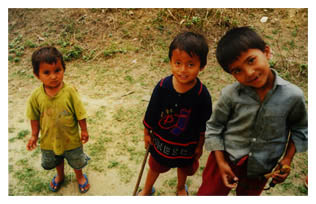
And
then there are the facilities. The
school
consists of a small two
story building, a long
one story enclosure, an
outhouse and a dirt yard. The
long building houses eight tiny rooms, each with no
lighting, tiny benches,
and a small blackboard that is made from wood and painted black. The
humidity has blistered the wood so badly, that in class three, I can
only write on the upper third of the board. This is where LKG (lower
kindergarten) UKG
(upper kindergarten) and grades 1-6
study. In the two story
building, the lower floors
have rooms for grades
7-10
and a kitchen/dining
area for the school boarding
students. The second
floor consists of the principle’s
office, a staff room,
and three dormitory rooms for
the 23 boarding
students.

The small yard is the stage
for the daily
assemblies every morning and night,
where students line up
by class and do simple
calistenics, followed
by prayer and sometimes speeches by upper level students. The principle
also makes
daily annoucements and
other things of that nature.
Then two students take
up drums and the students march
single file to their
classrooms. Very military like.
At the end of the day,
the students say another prayer
and leave the school
single file. Now Nawa Jyoti has
300
students so this takes
some time. The teachers are usually
standing around and I
spend my time waving my
hand off to each and
every student who feels it is
compulsory to say
“Bye bye madam"
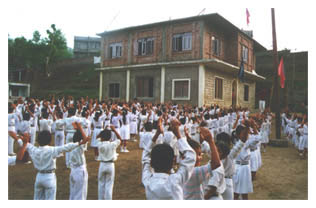
The
assembly was also
the stage for a very
disturbing scene the other
morning, for me at
least. The principle announced a
random check for
cleanliness. All the
students have
uniforms. The boys
where maroon pants and white shirts
with navy blue Nawa
Jyoti ties and the girls have white shirts, blue ties and maroon
pinafores. Your
hair should be neat and
tidy and this usually amounts
to cute ribbon bedecked
braids and such. This one
particular morning, the
teachers fanned out and began
checking the students.
They forced open their
mouth to check their
teeth, pull on their pigtails,
lift up their sweaters
to make sure they had their
belts on, check their
shoes, look under their
fingernails. When a
child was deemed ‘dirty’ the
teacher would slap
them, smack them about their head
or pound them on their
back, really hard. The assembly
ended with loud cries
and sniffling of students as
they marched to their
classrooms. So it would seem
that corporeal
punishment is alive and well in Nepal.
Quite often a teacher
will equip himself with a long
stick and use it
liberally. That is definately one
thing that I am not
used to and feel uncomfortable in the presence of. I cringed with every
hard slap across the face that made the child's ears ring.
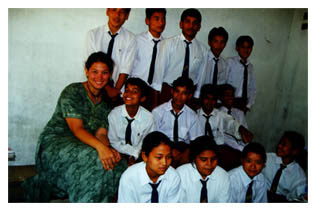
Class
eight, one of my favorites...inquisitive, smart and going far
The
students here are the best part. They are learning in
English during
school hours, but no practice outside of school. Add
to that teachers who themselves
are not comfortable in
english, teaching entirely in
english and you have a
very bad combination. Teachers
tend to teach exactly
from textbooks, not bothering to
explain difficult
concepts, most likely because they
are unable to in
english. And I have the occasional
student who comes over
from the govt schools and get
put in the same grade
but have almost no English comprehension, sitting in class completely
lost. I have
tried to counter this
in my math class with what I
call my Nepali helpers,
two smart boys who
occasionally explain
the concept in nepali to ensure
comprehension. Students
get by, by memorizing vast
quantities of data,
with no real comprehension of the
material. They are
excellent reciters, and when asked
a question, will no
doubt spit out a quote from the
book. When asked to
explain it in simple terms, they
are unable to. My
biggest challenge here is to teach
students to think for
themselves, not just recite and
regurgitate
information. We shall see how it works
out.
As
for me, I am adapting to a new way of life. My days
start at around 6:30.
At the hostel, boarders are up
at 5 am to study, but
me, I sleep in. At 7, I go to
the kitchen for tea and
bread, then it’s off to the
local tap. I am staying
in a small house next to the
school. The house
consists of two damp cinder block
rooms side by side. The
school rents out one for me
alone, and the owner
Bushnu B.K., his wife Purna Maya and their three kids stay in
the other. Behind us is
a communal kitchen shared with
another small house
just up a half flight of stairs. And the whole lot
share one outdoor tap
for all their water needs. There
I wash my face and
brush my teeth. The water is ice
cold and sometimes just
a trickle. I always dread
using the bathroom.
There is a small outhouse connected to the upstair house. It is half
height, and you have to squat to enter. Often, when there is no water to
‘flush’ you find
piles of crap building
up. Yes, definitely will take
some adapting.
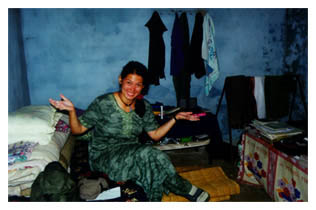
My room
is very humid and all my
clothes are continually
damp. The bed is a wooden
platform with an inch
thick cushion that does nothing
to alleviate the hard
wood. I have one lumpy comforter
that Ravi, the hostel warden, just bought for me and
a pillow harder than the bed. Thankfully, I
snagged a nice pillow
from Singapore Air and that is
my one luxury. The
light is woefully inadequate, but
as I am too tired to
read at night, it doesn’t really
matter.
After washing
up, I head back to the hostel
kitchen and eat the
first meal of the day at 8:30. In
Nepal, it always
consists of dhal bhat takaari, an
enormous pile of rice,
some vegetable curry and soupy
lentil gravy. Utensils
are not used. The Nepali way is
to mix everything
together with their right hand, and
then shovel the wet
mixture into their mouth very
quickly. It’s messy
but effective, and after awhile, I found that you couldn't blend the
mixture as well with a fork. There is reason for everything. Here,
Nepalis eat vast
quantities of dhal bhat, and I am
amazed at how quickly a
huge pile of food disappears,
washed down with cold
water (for me, boiled water.) I
eat with the boarders
and after the first day, I
stopped using the one
spoon that the school owns. When
in Nepal, do as the
Nepalis…
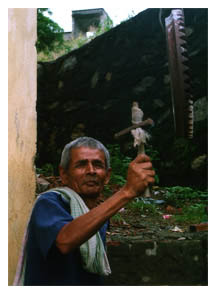 Baje,
the school janitor, handyman, and guy friday ringing the school 'bell.'
We all called him Baje, slang for Hajurbaba, 'grandfather' Baje,
the school janitor, handyman, and guy friday ringing the school 'bell.'
We all called him Baje, slang for Hajurbaba, 'grandfather'
School
begins at 9:45 with assembly, followed by first
period at 10:00. Two
periods, then a ten minute break,
two more periods, a
half hour snacktime, two more
periods, another ten
minute break, and finally the
last two periods and a
final assembly. The day is over
at 4:15 and it is a
long one. After school we get tea
and bread again
followed by the evening meal at around
7:00. This again is
dhal bhat takaari and the routine
is unchanging. The only
variety in food comes during
the snacktime when the
teachers head over to a small
snackshop serving up
hot samosas, curries, rotis, fried vegis and dried goods. I like Wei Wei,
Nepals dried noodles.
After dinner, the boarders must do
homework and read until
around nine when everyone goes
to bed, the town
included. There are no lights outside
and around nine, the
entire town is pitch black, save
for the light from a
few homes. There are periodic
blackouts, and a weekly
one on Monday nights for three
hours. This goes on
everyday. School is from Sunday to
Thursday with a half
day on Friday.
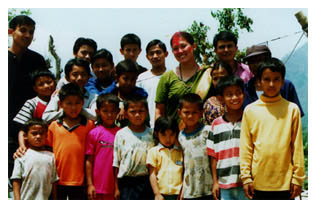
Me, Baje, Ravi and
TB, the hostel wardens and all 16 boarding students. There are only two
girls, the tiny cutie in front and the hidden one near right.
Life
in Nepal is so much more communal. Your business
is everyone elses
business. People walk right in and
make themselves at
home. People are always stopping in
on each other to talk
and all of life is lived out in
the open, on display.
There is not a word for privacy in the Nepali language. For example,
bathing. Aside from
a quick morning
washing, people bath thoroughly, once a week on
the only holiday,
Saturday. The most popular place to
bath is the Marsyandi
River which passes right
through Aaboo Kheireni.
Men and women both head down
to the riverside and
bath and do laundry. If not the
river, then the local
tap, which is a bit tricky for
women. Nepal is
traditionally a very modest country,
and women only bath in
public out of absolute
necessity but still
must be covered up. So you will
often seeing people
bathing right next to the road,
managing to wash
themselves under a lungi sarang type wrap.
Takes a bit of time.
Oh, and of course the water is
ice-cold. I’m very
happy to be in Pokhara with western
style showers and one
of the first things I did when I
got here was take the
longest hottest shower.
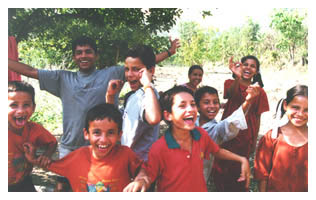
So…I
am adapting and getting used to life in a small
village. Everyone is
very nice and has gone out of
their way to make me
feel comfortable. The rule here
is ‘Guest is God’
and everyone is fighting to have me
over for dinner etc.
Such is the life of a celebrity in a small town.
return
to Volunteering
| 1
| 2
| 3
| 4 |
